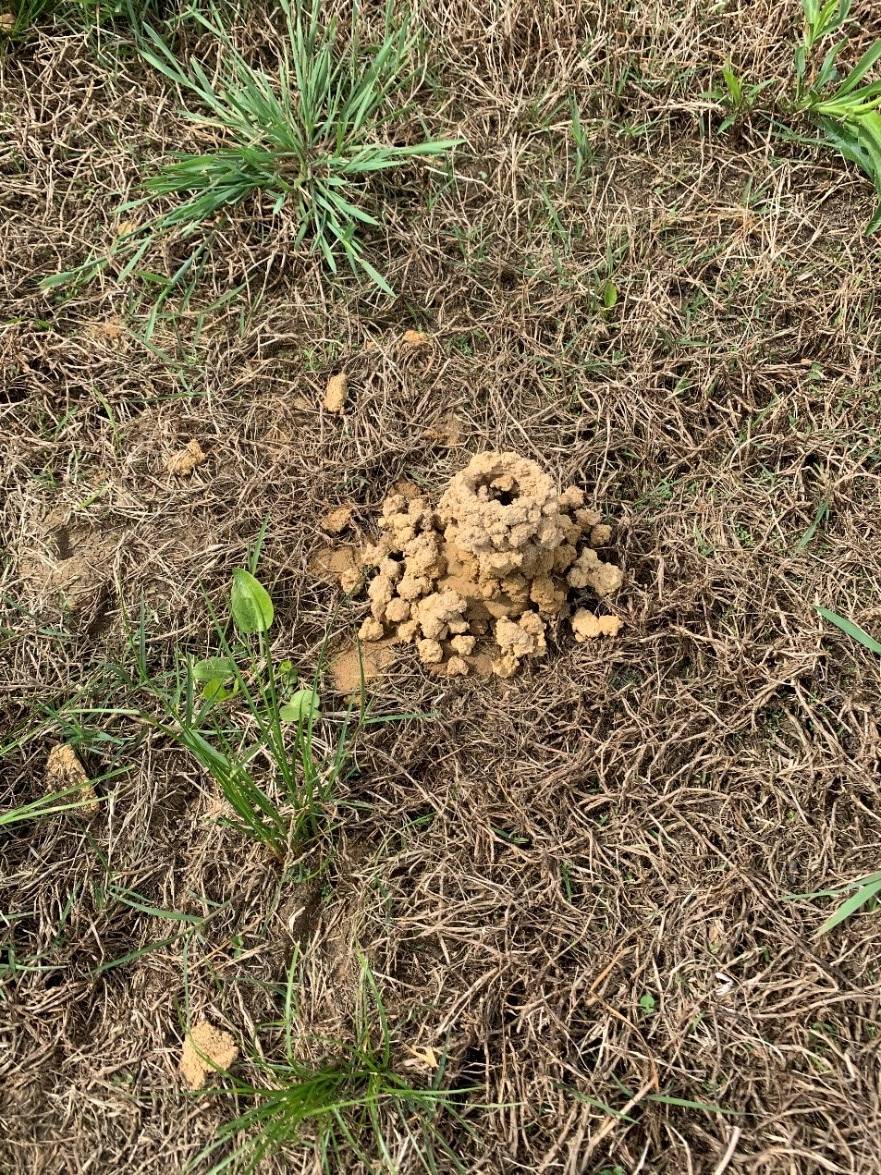Crayfish Chimneys in Your Yard
Searcy, Ark. –
In the springtime, especially after a rainy season I receive requests from people who have mounds of soil in their yard. These mounds are referred to as chimneys built by crayfish. As you might imagine, crayfish need saturated conditions to survive, so, where you have naturally-occurring high water tables, where people over-water their lawn and artificially raise the water table, or in years of exceptional rainfall, we see conditions that are favorable to and thus attract crayfish colonies.
The complaints we receive typically are not related to damage to vegetation, but to aesthetic concerns (i.e., the unsightly “chimneys” and soil mounds) and negative effects to lawn maintenance equipment (i.e., mowers being dulled after the blades hit these soils mounds). There actually is not much evidence in the scientific literature that crayfish cause significant damage to plants, as they tend to be detritus feeders and scavengers mostly, though some species are more carnivorous than herbivorous. So, we’re dealing primarily with people’s concern about appearance more than anything else.
The take home message? I can't offer any real solutions. There is nothing registered as a repellent. Additionally, there is an abundance of evidence showing that unauthorized use of such chemical ‘home remedy’ applications creates potential risk of impaired plant growth, contamination of local water sources, and secondary hazard exposure to other organisms.
You can try to correct the drainage of the site to promote dryer conditions. Because crayfish need saturated conditions near or slightly below the soil surface, lowering the water table or dispersing surface water to dry out the upper soil profile usually will make conditions less tolerable or less preferable for crayfish.
In normal years, that might be a possible approach for consideration, but, in years with persistent heavy rains, it is not possible to draw down local surface water very effectively.
When the soil dries up the chimneys disappear.
Take advantage of gardening information available online at https://www.uaex.uada.edu/yard-garden/default.aspx. The University of Arkansas System, Division of Agriculture is an equal opportunity/equal access/affirmative action institution. For additional information or fact sheets on building compost bins, you can contact your local county extension service. You can also follow Sherri Sanders on Facebook @UAEX.WhiteCountyAgriculture .
###
By Sherri Sanders
County Extension Agent - Agriculture
The Cooperative Extension Service
U of A System Division of Agriculture
Media Contact: Sherri Sanders
County Extension Agent - Agriculture
U of A Division of Agriculture
Cooperative Extension Service
2400 Old Searcy Landing Road, Searcy AR 72143
(501) 268-5394
ssanders@uada.edu
Related Links
The Arkansas Cooperative Extension Service is an equal opportunity/equal access/affirmative
action institution. If you require a reasonable accommodation to participate or need
materials in another format, please contact your County Extension office (or other
appropriate office) as soon as possible. Dial 711 for Arkansas Relay.
The Arkansas Cooperative Extension Service offers its programs to all eligible persons
regardless of race, color, sex, gender identity, sexual orientation, national origin,
religion, age, disability, marital or veteran status, genetic information, or any
other legally protected status, and is an Affirmative Action/Equal Opportunity Employer.
